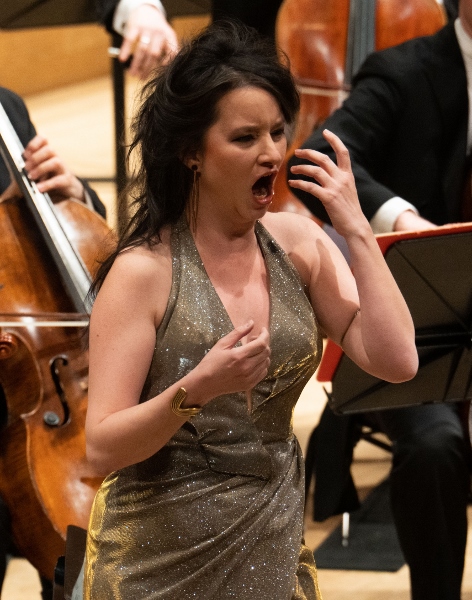Getting on for 27 years ago, Thomas Adès’ These Premises Are Alarmed was one of the pieces commissioned by the Hallé for a premiere in the opening series of concerts at the new Bridgewater Hall, conducted by Kent Nagano.
Now that Adès, then their composer-in-association, is about to be artist-in-residence (as composer, conductor and performer) over the coming two years, it was a neat idea to return to it. The three-minute piece struck me that first time by the fact that its vast list of percussion resources seemed to take literally the nickname of “kitchen” for that department, for it prescribes sets of “three large roasting tins laid face down” among the crotales, gongs, antique cymbals and other objects that have to be struck. Not to mention using a rototon in B flat and a geophone – the latter being like a shallow drum filled with fine gravel, which introduces the piece, working up from niente to ppp with a sound rather like distant surf.
All in a good cause: the point was to explore the acoustics of a new auditorium – and perhaps also to challenge the players and their director, with constantly varying time signatures and speeds, rapid dynamic changes, and even a requirement for the pianist to get inside her instrument and stop a string by hand. Alarmed? We might well have been.
However – and this is the good news of the night – in the hands of conductor Jonathan Bloxham, who took the concert’s entire programme on at very short notice, there was no sign of panic, or even discomfort. Today’s Hallé musicians are well able to meet such demands, and more, and with him at the helm they had a sure hand and, better still, a guide with deeply musical instincts and an infectious sense of enjoyment.
 After Adès, Berg’s Lulu Suite (based on the opera) seemed mellow and tuneful. Its textures and phrase shapes are so much in accord with what we hear as traditional orchestral writing that the lack of a “normal” harmonic underlay hardly seems to matter. Anna Prohaska (pictured), also appearing in place of the originally advertised soloist, brought her lovely soprano tone to Lied der Lulu and the final words of the piece, delivered from the raised eminence of the choir seats for more dramatic effect.
After Adès, Berg’s Lulu Suite (based on the opera) seemed mellow and tuneful. Its textures and phrase shapes are so much in accord with what we hear as traditional orchestral writing that the lack of a “normal” harmonic underlay hardly seems to matter. Anna Prohaska (pictured), also appearing in place of the originally advertised soloist, brought her lovely soprano tone to Lied der Lulu and the final words of the piece, delivered from the raised eminence of the choir seats for more dramatic effect.
The main course of this programme, and the title on which it had been sold, was Mahler’s Symphony no. 1. That, too, has its history for the Hallé: it was the work with which Kent Nagano ended his programme in 1998 on the day their big financial crisis broke as headline news (“The Titan” in danger of becoming the Titanic, it seemed, as the film was fresh in town at the time) and it earned them a standing ovation then.
This may have been a less emotionally fraught occasion – and the piece itself is really a repertoire work these days, conducted by many a maestro – but the finesse and poise of its performance under Bloxham were exceptional and rewarding. I’ve seen him do it before, with the National Children’s Orchestra in 2019, which was an impressive achievement in itself, but this was something very special.
His sense of rhythmic life is allied to an eye for detail, combined with a way of making Mahler’s detailed prescriptions of speed, articulation and little pauses all cohere into flowing paragraphs: it’s an exceptional gift that he can control a performance so eloquently and also, it seems, share some fun in the making of it. The trio of the second movement had beautifully flexible phrasing, and the gentle sounds towards the end of the third were delightfully balanced and blended.
The finale, of course, is what any Mahler 1 aims for. This retained its sense of poise to the end, not blaring its triumph but simply enjoying it, and earned a justly warm reception from the Manchester audience.














Add comment